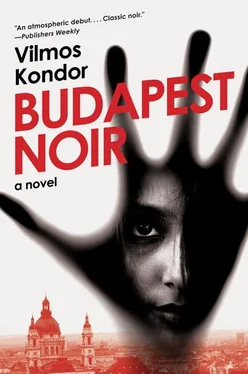During the eulogies, he passed his eyes over the elite who were on hand. A couple of them seemed to have fallen asleep. General Schamburg-Bogulski, head of the Polish delegation, undoubtedly nodded off, jerking up his head at one point, giving a quick, confused look around before deftly suppressing a yawn. Horthy sat there with an unruffled expression; at most, he would sometimes fiddle with the handle of his sword. Gömbös’s widow, sons, and two siblings cried quietly as his mother stared glassy-eyed at the coffin.
After the eulogies, there came Siegfried’s Funeral March from Wagner’s Ring of the Nibelung , conducted by Erno Dohnányi. Gordon was practically counting the measures to determine when the music would end. Once the final notes fell silent, the procession got under way, with Raffay in the lead.
Gordon escaped from the Parliament building in time to see the next act. A soldier held a simple wooden cross up high, and behind him six black horses pulled the hearse, followed by thirteen more carriages. The last two were perhaps the most notable: one held the wreath sent by Il Duce—Mussolini—and the other, a wreath of a thousand roses from the Italian king, Victor Emmanuel III. The pallbearers now also appeared, carrying on their shoulders the coffin, which was draped with the national flag and topped off with Gömbös’s combat helmet and sword. By now, Horthy had removed the calpac from his head and was waiting on the steps to take the lead in the procession, behind three peasants donning sheepskin waistcoats. Gordon found this especially appealing. The man in the center, an older fellow with a white mustache, was carrying a silver tray and on that a little box containing soil from the village of Murga, so the prime minister could rest in the earth of his hometown. Gordon looked at his watch. It was already past eleven-thirty. The funeral procession would take a while, but there was nothing to be done. Turcsányi wanted an article compiled from interviews with the ambassadors, and Gordon would not find a better occasion than this. He buttoned his jacket and turned up his collar, sighing as he adjusted his hat. He started off with the mourners toward Kerepesi Cemetery.
The man from the foreign ministry kept his promise—by the time the procession reached Blaha Lujza Square, Gordon had already completed both interviews. He stepped out of the crowd and headed toward the Oktogon. With the trams out of service, he had to walk, but this didn’t bother him at all. Indeed, he went by foot all the way to the Circle, where, in keeping with his habit, he looked up at the balcony door. It was closed. The old man was once again bumming about. Gordon sat down on a bench and began writing in his notebook. He hadn’t been able to take notes during the procession, so it was now that he set down on paper those hackneyed phrases the ambassadors had rattled off. He could have conjured up the article from his head without any interviews at all; he’d known exactly what they would say. The U.S. ambassador, John Flournoy Montgomery, clearly disapproved of all the fuss—this much, Gordon could see on his face—but naturally he, too, chose his words diplomatically: Gömbös had been a European leader, his death was a great loss, Hungary had to look to the future, and so on.
When Gordon finished, he screwed the cap back on his fountain pen and, looking at the trees, once again fell to thinking about the dead girl, who was distracting him more and more. A while back, he’d heard talk around town about women chosen out of catalogs. Whoever was behind the girl’s death was out of Csuli’s weight class. Five hundred pengős for a woman? No matter how gorgeous she was, this was a ton of money. Csuli and his gang, including the likes of Józsi Laboráns, were lucky to make ten to fifteen pengős a day with their women. These were low-class characters who spent their money on drinks, cards, or horseracing as soon as they made it. The girls quickly withered and were sold to some hovel off in the provinces, unless of course some venereal disease did them in first.
Five hundred pengős was a big and thoroughly considered investment. Anyone who spent that much for a girl served important clients. And no doubt he didn’t send the gals to bed down customers in some shady servant’s room in some shady neighborhood like Terézváros. Gordon would have been lying to himself had he denied that there was anything unusual about this particular girl. But one thing was certain: no matter what he might find out about her, if he found anything at all, it would not be pleasant. And in all probability, he couldn’t write about it. Even if he were to find the other girls who served this high-class clientele, not a single paper would be willing to publish the article. And yet . . .
“It’s as if I was just looking at your dad,” said Mór, plopping down beside Gordon and placing a basket of apples in front of him.
“Apple jam again, Opa?”
“Indeed!” proclaimed the old man. “Just look at how lovely they are. Eighteen fillérs a kilo. I didn’t waste any time in buying five kilos.”
“So you’re giving it another try.”
“I certainly am.”
“It can’t turn out bad. True, everyone says you can’t make jam out of apples, but applesauce is the best-case scenario.”
“You see, son. This is the challenge here.”
“Remember when you cooked up that jam from some wild berries you found on a hill across the river?”
Mór shuddered, then gave a dismissive wave of the hand. “Don’t you worry, son. Not even then did anything bad happen to me.”
“Opa, for three days you didn’t even come out of the bathroom.”
“Well now . . . but it was tasty.”
“As long as we’re on the subject, Opa, how hard of a punch to the belly does it take to kill someone?”
The old man turned to Gordon and scrutinized his face. “So you’ve been to the coroner’s.”
Gordon nodded.
“Harder than hard,” said the old man. “It takes quite a blow to cause death that way.”
“That’s what Pazár said, too.”
“But you’ve also got to know where to hit, and how hard,” continued Mór.
“You’re trying to say that if I take a swing at someone, say, a woman, then . . .”
“What I’m trying to say, son, is that whoever did it has probably done it before. The chances of doing so by accident are quite small.”
Gordon closed his notebook and put away his fountain pen.
“Tell me, son,” said Mór, leaning back on the bench. “You know today’s world better than I do. What do you think of this fellow Darányi?”
“What do I think, Opa? He’s a politician. Maybe he’ll be able to rein in the National Unity Party, maybe not.”
“And if not?” The old man looked Gordon in the eye.
“You know Krisztina was in Berlin this summer, right?” asked Gordon.
“She was making some sort of drawings for the Olympics.”
“You could say that. Well, she met a man called Günther, a longtime cop. A detective. This Günther was looking for a missing person. Don’t ask me how they met,” added Gordon in reply to the question in Mór’s eyes. “You can never tell with Krisztina. Anyway, this Günther took Krisztina for a walk in Berlin. He showed her how the Jew-bashing placards on Alexanderplatz had just been replaced by Olympic ones. Well, one of the top figures in this German leadership paid a visit to Gömbös in the sanatorium near Munich. His name is Rudolf Hess. Have you heard about him?”
Mór shook his head.
“He used to be Hitler’s deputy, and he edited Mein Kampf . This man conveyed Hitler’s personal best wishes to our prime minister. And as you may remember, at a National Unity Party meeting not too long ago, those on hand enthusiastically sang the Horst Wessel Song—the Nazi Party anthem, that is. And then there was the Földes surveillance affair.”
Читать дальше
Конец ознакомительного отрывка
Купить книгу












